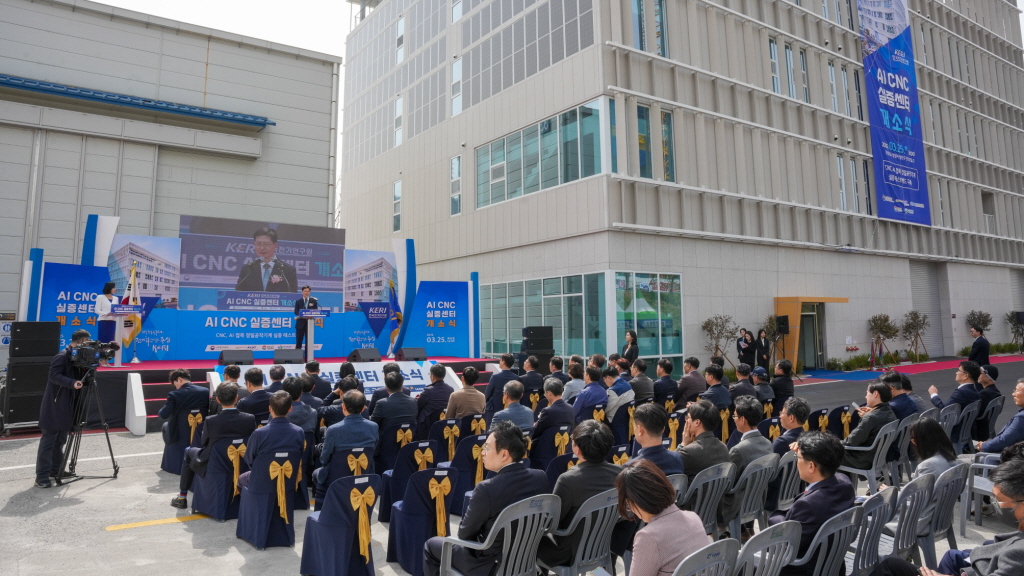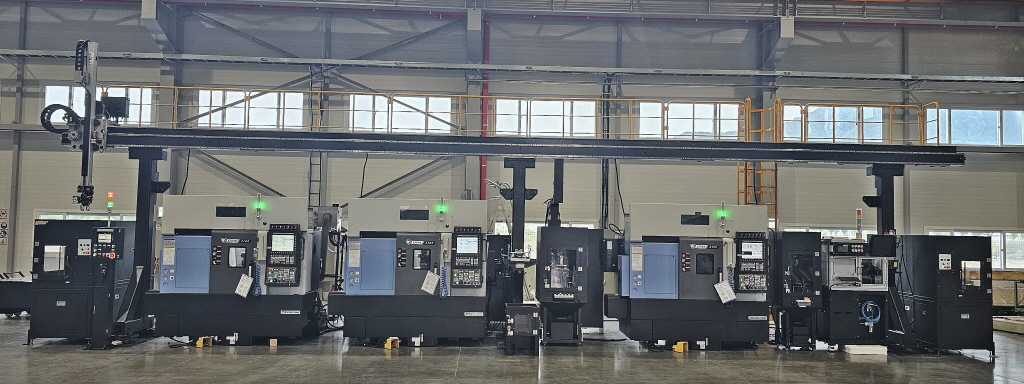한국전기연구원(KERI)은 대한민국 공작기계 분야 기술 자립과 첨단화를 추진할 ‘AI CNC 실증센터’ 개소식 행사를 25일 창원본원에서 개최했다. KERI는 실증센터를 기반으로 경남 창원산단에 위치한 공작기계 분야 기업들의 제품 성능을 검증하고, 이들 간 협업 및 연계를 추진해 CNC 기술의 완성도를 높일 예정이다.
전기연구원, 국내 최대 ‘AI CNC 실증센터’ 개소
산업부·경남도·창원시 협업, 300억 인프라 구축
해외 의존도 높은 공작기계 분야의 기술 독립을 넘어 AI 기능 탑재까지 추진하기 위한 토대가 마련됐다.
한국전기연구원(KERI)은 대한민국 공작기계 분야 기술 자립과 첨단화를 추진할 ‘AI CNC 실증센터’ 개소식 행사를 25일 창원본원에서 개최했다.
공작기계는 기계를 만드는 또 다른 기계라는 의미로 ‘마더 머신(Mother machine)’으로 불린다. 그중에서도 가장 중요한 ‘CNC(수치 제어반, Computer Numerical Control)’는 인간이 작업하는 방식과 유사하게 동작한다. 두뇌 역할을 하는 CNC 상위제어기가 컴퓨터를 통해 수치 정보를 처리하고, 이후 손발에 해당하는 CNC 하위제어기인 ‘구동계(모터 및 모터 드라이브)’에 위치/속도/회전 등 각종 활동을 지시하는 구조다.
반면에 CNC는 최고난도의 분야로, 우리나라는 90% 이상을 일본과 독일에서 수입하고 있을 정도로 기술 저변이 약하다.
4차 산업혁명 시대를 맞아 초정밀 기기 가공이 더욱 필요해진 상황에서 CNC의 기술 자립은 국가 전략기술 분야 경쟁력을 좌우할 키워드다.
이를 해결하기 위해 국내에서도 CNC 국산화에 많은 노력을 기울였고, 일정 구성 요소 단위에서는 성과도 거뒀지만, 해당 기술을 공작기계 전체와 통합했을 경우에서의 종합적인 신뢰성까지는 확보하지 못해 상용화에는 실패했다.
지난 10여년 넘게 공작기계 분야를 연구해 온 KERI 정밀제어연구센터는 이러한 한계를 인식하고, 좀 더 거시적인 관점에서 CNC 기술에 대한 장기 신뢰성을 검증할 수 있는 시험 인프라 구축 사업을 추진하게 됐다.
해당 사업은 대한민국 기계산업의 중심인 경남도와 창원시가 함께했으며, 지난 2019년 일본의 수출 규제 조치 이후 본격화됐다.
이후 2021년 정부가 경남 창원시를 ‘정밀기계 특화단지’로 지정했고, 2022년 ‘AI CNC 실증센터’가 착공되기 시작해 현재에 이르게 된 것이다.
AI CNC 실증센터는 지하 1층 지상 5층으로 구성돼 있고, 건축연면적은 3,405m2(1,030평)이다. 건물 공사비는 120억원(도비 36억원, 시비 60억원, KERI 24억원)이며, 180억 규모의 장비 총 45종 73대가 들어선다.
KERI는 실증센터를 기반으로 경남 창원산단에 위치한 공작기계 분야 기업들의 제품 성능을 검증하고, 이들 간 협업 및 연계를 추진해 CNC 기술의 완성도를 높일 예정이다. 각각의 역할별로 앵커기업(국산 CNC 원천기술 개발), 공급기업(핵심부품 사업화), 가공기업(공작기계에 CNC 장착)으로 분류해 기술 개발부터 사업화까지 유기적으로 지원한다. 이를 통해 2030년까지 경남 지역에 보급되는 CNC의 50% 이상을 국산화하고, 연간 3천억 원대 수입대체 효과를 거둔다는 목표다.
뿐만 아니라 공작기계에 첨단 인공지능(AI) 기술도 도입한다. 공작기계는 연식이 오래된 제품이 많고, 산업 현장 공정별로 데이터가 상이해 AI를 도입하기 어려운 분야로 손꼽힌다. 기업에 따라 업계 기밀 정보 유출 우려, AI 전문 인력의 부재, 고가의 소프트웨어 비용 부담 등 난관도 있다. 무엇보다 AI를 잘못 도입하면 고가의 공작기계와 가공물에 손상이 발생할 수 있어 중소·중견기업에서는 더욱 보수적일 수밖에 없다.
반면에 이번 ‘AI CNC 실증센터’를 통해 KERI 인공지능연구센터 전문가들이 신뢰성을 갖춘 빅데이터를 다수 확보하고, 공작기계의 첨단화와 스마트화를 추진한다. 2030년까지의 목표는 경남에 500개 이상의 AI 팩토리를 구축하는 것이며, 연간 1조원 이상의 경제적 효과 창출이다.
KERI 김남균 원장은 “우리나라는 세계 5위의 공작기계 생산국으로 중·저가형 제품 위주로 공급하고 있으나, CNC 등 핵심 부품은 선진국에 의존하고 있어 높은 부가가치 창출에 한계가 있었다”며 “우리나라에서도 최고 품질의 CNC를 생산할 수 있다는 자신감을 산업계에 심어줄 것이며, 단순히 국내 수요를 충족하는 것을 넘어 글로벌 시장에서도 기술 경쟁력을 갖출 수 있도록 노력할 것”이라고 밝혔다.
한편 KERI는 ‘AI CNC 실증센터’를 스마트 첨단 공작기계 분야 강소기업을 육성하는 전진기지로 삼는다는 계획이다. 또한, 우주항공용 5축 CNC 국산화 개발 등 미래 산업 분야에도 효과적으로 대응할 수 있도록 기술 지원 범위를 넓혀나갈 예정이다.
KERI는 과학기술정보통신부 국가과학기술연구회 산하 정부출연연구기관이다.

